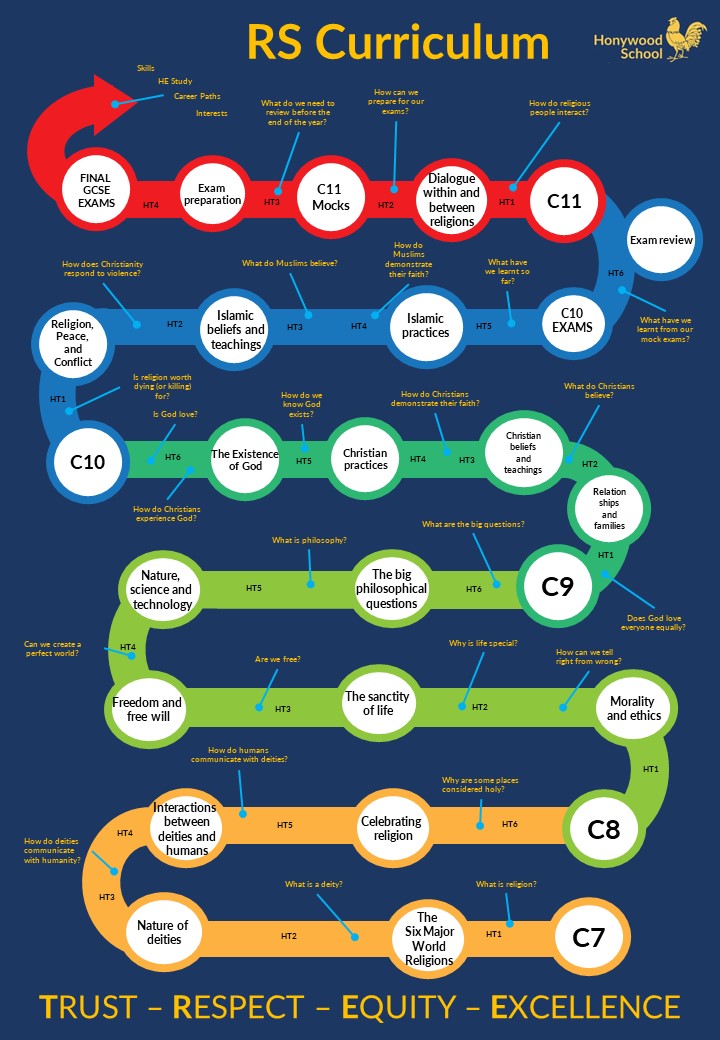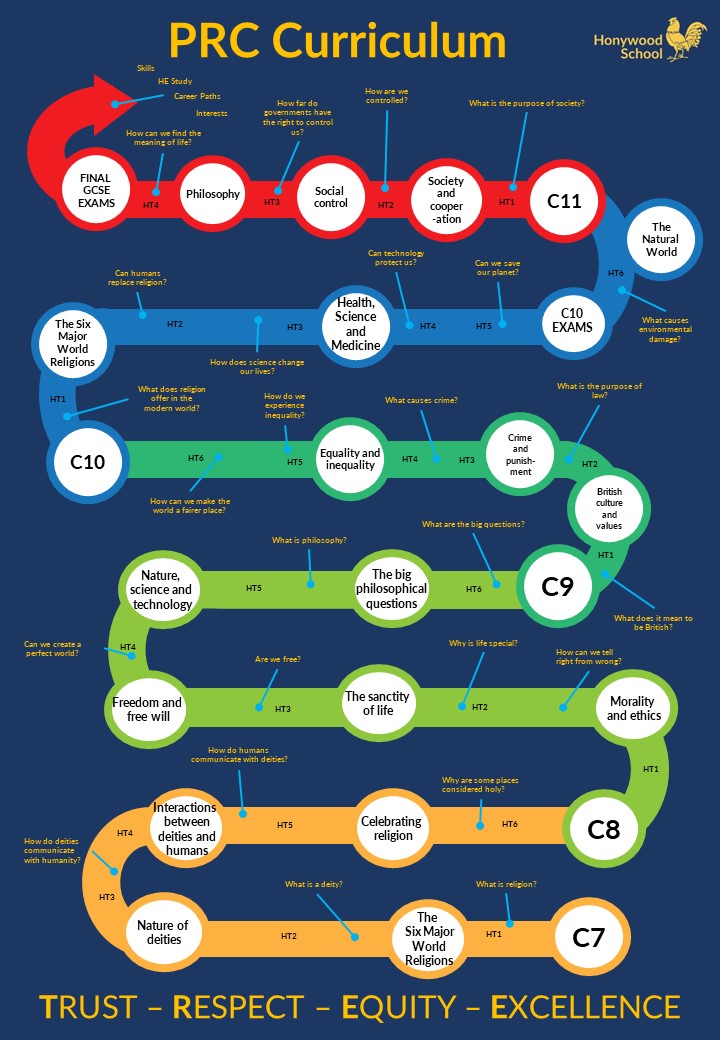Philosophy, RELIGION AND CITIZENSHIP
Overview
Philosophy, Religion and Citizenship will appeal to learners who have an interest in the big questions in life, who are accepting of a range of beliefs and approaches to living, and who are passionate about voicing their own opinions. We aim to develop learners’ understanding of the diversity of cultures that coexist in Britain, and the ethical ideas that have shaped humanity over the millennia. As such, cultural and moral capital are of huge relevance to us. We also develop learners’ knowledge capital through a close focus on critical thinking and analytical writing.
The National Curriculum set out by the Department for Education states that schools are required to teach RE up to the age of 18. At Honywood, the Core Philosophy, Religion and Citizenship course fulfills that requirement and sets religious beliefs in a wider framework of its effect on how people think and act within society. The Department for Education also states that "parents can withdraw their children for all or part of the lessons".
KS3
In Cohort 7, learners develop their knowledge of what religion is, and study the six major world religions in detail. We compare aspects of belief, teaching and practices, and look at some of the major figures from the religions. We explore how believers celebrate their beliefs in terms of worship, prayer, and significant events such as festivals and pilgrimages; how believers interact with each other and their deities; and specific beliefs about deities, creation and afterlife.
In Cohort 8, the focus shifts away from religion to philosophy. We begin the year by studying Ethics - our understanding of right and wrong. Learners consider how we make ethical choices, and how we establish our moral codes. We then see how moral codes apply to real-life situations and explore key moral concepts such as the sanctity of life. We continue our focus on real-world ethics by examining war, medical ethics, freedom, animal rights and the environment.
KS4
In Cohort 9, learners may choose to work towards Religious Studies GCSE. Additionally, all learners will continue to study Philosophy, Religion and Citizenship as a core course.
RS GCSE
The course allows learners to explore, develop, enhance and modify their views on a range of moral and philosophical questions facing the world and provides them with opportunities to hone their skills on independent thought and argument. By presenting learners with a range of both religious and non-religious approaches to these issues, learners can develop an awareness and empathy around the views of others; equipping them with the ability to relate to people from different standpoints whilst affirming or questioning their own preconceived views.
The main religions focused on through our course are Christianity and Islam. Learners will grapple with interpreting Bible and Qur’an scriptures and applying their learning to support beliefs and opinions in response to controversial statements. Learners will also engage in understanding the different beliefs and practices of Islam and Christianity, looking at a range of divergent views within each, and accounting for this variation by referring to scriptural teachings. Religious practices are explored, as demonstrations of divergent beliefs, and the significance and influence of varying beliefs is analysed and evaluated. They will look into the founding stories of each religion and explore unique aspects that make each religion distinct: looking, for example, into the purpose of fasting during the month of Ramadan, why Christians are baptised, and concepts in both religions governing life after death.
In Year 11, learners will complete the course and face a mock exam over term 1, and will then commence the process of revision for their final GCSE exams in the summer. Learners will practise examination questions and also revisit any of the content that they studied throughout Cohorts 9 and 10, using data from the mocks as a guide. The entire course will be reviewed and audited, before learners sit a second mock in March. This will act as a final guide to preparing for the summer exam.
Core PRC
In Year 9, learners will start the year by studying British culture. They will gain an understanding of British values; how British culture has been shaped by invaders, the British Empire, and Christianity, and how politics and the Rule of Law work in Britain. We then zoom in on law and crime, looking at the British justice system, how crimes have changed over the centuries, the British prison system, corporal punishment, and how justice intersects with revenge and forgiveness. Finally, we consider Equality - between men and women, between races; between different sexual orientations and gender identities; between different class systems and the rich and poor.
In Year 10, we begin by focussing on extremism: how it is defined, and different types of extremism such as religious extremism and political extremism. We consider several case studies of specific extremist groups, and look at the Israel-Palestine situation as an example of how extremism can shape current events. We then move on to looking at medicine, science and society: learners develop their understanding of how the NHS works, how science intersects with how life begins; the beliefs and controversies surrounding abortion and euthanasia, and the role of the family in society. We finish the year by considering the question “Does God Exist?”, introducing learners to various arguments for and against the existence of God such as the problem of evil and suffering, belief in miracles, the cosmological argument, and the teleological argument.
In Year 11, learners begin the year by studying war and peace: how it links to ethics and religious beliefs; the concept of Just War Theory; holy wars and Jihad; how warfare has changed in the modern world; and weapons of mass destruction. We end the year by reading The Life of PI, a novel that explores ideas of spirituality, religion and selfhood.

PRC
PRC aims to develop learners' cultural capital through an examination of how people make decisions and how global societies are structured. It includes aspects of sociology, such as examining the UK political and legal systems; it considers the role of religion as a social force, both in the UK and worldwide. It leads learners to examine the philosophical purposes and intentions behind the forces that shape our world, and the role of the individual in society. It returns to the six major world religions, looking in depth at how they interact, and their global influence in an increasingly secular age. We consider the ways in which humans interact with each other, and the natural world.

